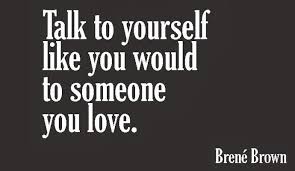
Talking to yourself has a bad connotation. Most people associate it with isolation and low self-esteem. But the truth is that all of us have an inner dialogue going on in our heads most of the time. By being aware, we can learn to direct that dialogue in ways that are self-validating and strengthening.
The way that we talk to ourselves is a powerful determiner of our moods and behavior. Our self-talk literally becomes a self-fulfilling prophecy and eventually our reality. As Elinor MacDonald has said, “The things that you keep silently telling yourself are your most important conversations. Whatever you habitually dwell on in your mind you will become, express, or experience. Your subconscious mind will be your best friend or your worst enemy.”
I recall a friend named Pete. He was told at a pretty young age that he was a “bother” and would never amount to anything. Shortly after high school Pete, although bright and talented, got into serious trouble with the law and served a long prison sentence. The voices he heard from others became his own self-talk and he eventually became the person he and others told him he would become.
The Power of What We Say to Ourselves
On the other hand, I think of the experiments conducted by Drs. Robert Rosenthall and Lenore Jacobson at Harvard University. They would go into elementary schools and administer bogus achievement tests, randomly select a few students from each class, and arbitrarily assign them high scores on the test. The results were reported to the staff and teachers but not the students. By the end of the year those students had risen to the top of their classes academically. The teachers thought and talked differently to and about these students which influenced how they thought and talked to themselves. This phenomenon became known as the Pygmalion effect. The messages we hear from others as well as our own self-talk has far-reaching consequences on our success and self-esteem.
What about You?
What messages from others have you internalized? Are they positive and supportive or negative and self-defeating? More importantly, what messages do you send yourself as you go about your day-to-day activities? Are they strengthening and empowering or weakening and discouraging?
If you have followed me for a while you know I like to talk about key moments—tough experiences in which it is easy to react in negative and preprogrammed ways. The way we talk to ourselves makes all the difference in how we handle our key moments. The good news is that we can take responsibility for our self-talk during, following, or even in anticipation of a key moment. Doing so is both empowering (short-term) and healing (long-term).
However, being aware and consciously altering our self-talk is also effective at other times. It is a great way to become more loving and supportive of ourselves. I recently had a great talk with myself in the bathroom mirror. It lasted for about an hour. I shared how I perceive myself and talked to the man in the mirror about what I like about him. I grieved about a few of the challenges I’ve gone through lately and came up with some actions to meet them. It was a very moving experience. I left feeling a deep love and support for myself and empowered to deal with life.
Goal of Therapy
Someone once said that the goal of therapy is to teach the individual to become his or her own therapist. That is exactly what good self-talk does. It comes from a commitment to respect ourselves and support ourselves in good times or bad. Most of us are better at supporting other people than ourselves. Learning to have good, uplifting, positive dialogues with ourselves, whether driving down the road, during morning meditation, or in the middle of a difficult experience is a great way to discover inner strength and love.
If you have read my book, The Hero’s Choice: Living from the Inside Out , you have seen Hal Stratton’s personal transformation. A big part of this was learning to talk differently to himself by using the “Stop-Look-Listen-Choose” technique. The Hero’s Choice Workbook will also help you apply the lessons from the book to your everyday life. Learn the power of taking control of your life and experience more love and serenity by changing the way you talk to yourself.
